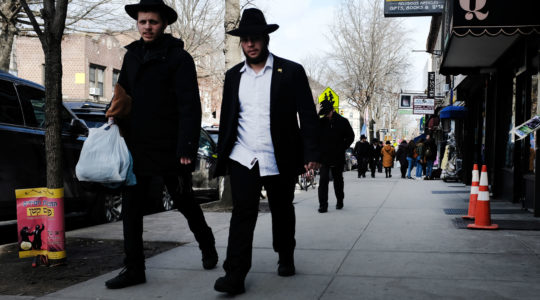JERUSALEM, Dec. 20 (JTA) — With the end of the U.S. and British air strikes against Iraq, Israel has lowered its preparations against a possible Iraqi attack. But Israeli officials say they see the halting of the strikes as a lull in the ongoing crisis with Iraq, and not an end to it. During the recent crisis, Patriot anti-missile batteries were stationed outside major Israeli cities. But with the halt to the strikes over the weekend, the batteries were moved back to army bases. Patriots were used during the 1991 Gulf War to try to intercept Scud missiles fired by Iraq at Israel. The Israeli army was expected to release hundreds of reservists who had been called up as preparedness measures. Gas mask distribution centers also reduced their operations, which were increased last week. Defense Minister Yitzhak Mordechai said the situation in Iraq would still have to be closely watched. “I believe the United States, Britain and the U.N. will demand that the [weapons] monitoring is renewed, one way or another, because one country can’t be an unconventional weapons threat to its neighbors,” he said. The defense minister was speaking during a tour of a Patriot missile battery stationed in north Tel Aviv. Most Israelis reacted to the latest tension in the Gulf with indifference. Gas mask distribution centers reported a low turnout of people seeking to update their kits. Stores did not report runs on masking tape and plastic sheeting, despite instructions from the defense establishment to have the items on hand, for use in sealing off rooms from poison gas attacks. The tensions did have a major impact, however, in the West Bank, where Palestinians and Israeli troops clashed Saturday during pro-Iraq demonstrations. More than 100 Palestinians were reported wounded in the clashes. The Palestinian Authority, trying to restrict demonstrations of solidarity for Iraq, detained a number of Palestinian journalists covering the events. On Sunday, the Palestinian Authority also lifted a ban on foreign news organizations that had attempted to cover Palestinian demonstrations in support of Iraq. Palestinian officials had imposed the ban in an effort to squelch reports about the demonstrations in the West Bank and Gaza Strip, a source of embarrassment to the self-rule government, which has sought improved ties with the United States.

Help ensure Jewish news remains accessible to all. Your donation to the Jewish Telegraphic Agency powers the trusted journalism that has connected Jewish communities worldwide for more than 100 years. With your help, JTA can continue to deliver vital news and insights. Donate today.





